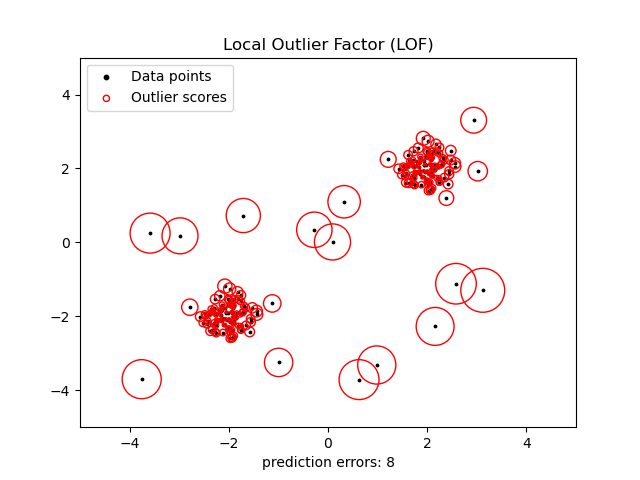Note: The master branch may be in an unstable or even broken state during development. Please use [releases][github-release] instead of the master branch in order to get stable binaries.
Note: The current version is not intended for use in production
SOD - simple outlier detection. A simple solution for detecting anomalies in a vector data stream with a focus on being:
- Simple: well-defined, user-facing HTTP API
- Fast: benchmarked 1,000 prediction/sec on core, million samples
- Storage: automatically maintains the actual required range of the sample data
- Without training: Uses the k nearest neighbor algorithm to detect anomalies without training data
SOD is written in Go and consists of several components: a database, an algorithm for detecting anomalies, notifications, and an HTTP interface for access. The data storage system uses etcd/bbolt - a key/value embedded database that saves a set of data to disk. Anomaly recognition is based on the LOF - local outlier factor method. This method uses the k nearest neighbor method to detect anomalies. To notify about an anomaly found, SOD sends a POST request with data.
The simplest method to run is to run the docker image and throw the necessary environment variables.
SOD uses the configuration method via environment variables. Running SOD from the repository
$ git clone https://github.com/robotomize/sod.git
$ cd sod
$ go build cmd/sod
or build docker image
$ docker build .By default, the application runs on :8787. SOD operates in two modes:
Predict(read only) is getting the value outlier or not outlier without saving the state.
Your request will be mapped to the following structure
POST request to /predict
{
"entity": "user-lives",
"data": [
{"vector": [10], "extra": "robotomize", "createdAt": "timestamp"},
{"vector": [10], "extra": "robotomize", "createdAt": "timestamp"},
{"vector": [10], "extra": "robotomize", "createdAt": "timestamp"},
{"vector": [100], "extra": "robotomize", "createdAt": "timestamp"}
]
}curl -X POST -d '{entityId: "user-lives", "data": [ {"vector": [10], "extra": "robotomize", "createdAt": "timestamp"}, {"vector": [10], "extra": "robotomize", "createdAt": "timestamp"}, {"vector": [10], "extra": "robotomize", "createdAt": "timestamp"}, {"vector": [100], "extra": "robotomize", "createdAt": "timestamp"}]}' http://localhost:8787/predictresponse
{
"entity": "user-lives",
"data": [
{"vector": [100], "outlier": true, "extra": "robotomize", "createdAt": "timestamp"}
]
}Collect(read write) - To save the value in SOD, recognize it, and inform your applications about the outlier, send a POST request to the /collect address
let's say we collect weather data
POST request to /collect
{
"entity": "weather",
"data": [
{"vector": [20, 365, 7], "extra": "20-10-2020", "createdAt": "timestamp"},
{"vector": [21, 364, 2], "extra": "21-10-2020", "createdAt": "timestamp"},
{"vector": [20, 365, 5], "extra": "22-10-2020", "createdAt": "timestamp"},
{"vector": [25, 370, 0], "extra": "22-10-2020", "createdAt": "timestamp"}
]
}response
{"status": "ok"}you can check the viability
curl -X GET http://localhost:8787/healthresponse
{"status": "ok"} - Implement tests
- Add examples
- request reformat
- Add docs
- ci/docker image
- cli client
- Another transport gateways
- Try implement R tree/R*tree
- Try implement isolation forest alg
- DB abstraction layer
- Web ui
SOD is under the Apache 2.0 license. See the LICENSE file for details.

